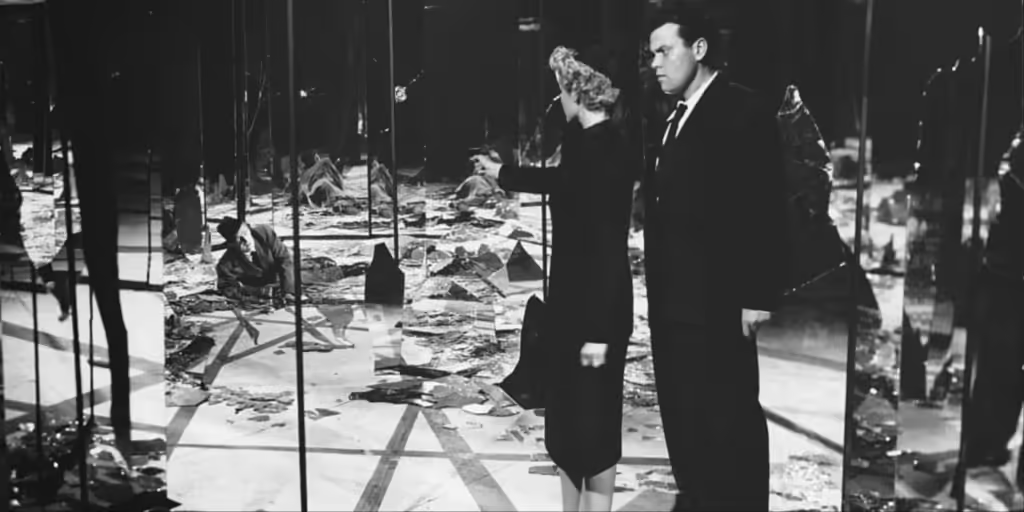Photo Credit ( Pixabay )
In thrillers, simpler, more commercially driven storylines frequently eclipse complexity. While superhero movies with simple stories rule the box office, more nuanced thrillers provide enduring curiosity and spark more in-depth conversations. These movies demand audience participation due to their complex storylines and wide range of themes, which rewards repeated viewings with fresh perspectives. Here are five of the most intricate thrillers that have mesmerized viewers with their intricate narratives.
- M. (1931) Fritz Lang was the director.
Fritz Lang’s M, which explores the moral uncertainty of justice and digs into the mind of a serial child killer, is regarded as a seminal work in German Expressionist film. The way in which the police and the criminal underground are portrayed in the movie underscores Lang’s pioneering research on criminal psychology and the moral conundrum of “the purpose justifying the means.”” It has a lasting effect on contemporary serial killer movies, influencing how the genre approaches psychological nuance.
- The 1948 film The Lady from Shanghai Under Orson Welles’ direction
Shakespearean tragedy and classic noir elements are combined in Orson Welles’ The Lady from Shanghai. The film’s convoluted storyline and unclear resolution showcase Welles’ talent for crafting intricate psychological portraits. The movie explores the transformational power of love and the essence of evil as Welles’ character becomes entangled in a web of deceit.
- Alfred Hitchcock, director of Vertigo (1958)
Vertigo, directed by Alfred Hitchcock, is a psychological thriller masterwork known for its deft use of dream sequences and complex narrative turns. Hitchcock examines themes of identity and loss through James Stewart’s portrayal of a detective struggling with acrophobia. Rewatching the movie is worthwhile because of its deep storyline, which reveals all of the nuanced details of its intricate plot.
- The 1967 film Point Blank Lead director: John Boorman
A commercial criminal thriller masquerading as an arthouse masterpiece is John Boorman’s Point Blank. The film’s unique storyline and mysterious lead character make viewers consider the nature of retribution and reality. Its impact can be seen in succeeding pieces, such as The Limey by Steven Soderbergh. The film’s ambiguity and open-endedness add to its reputation as a difficult cinematic experience.
- Lost Highway (1997–) David Lynch is the director.
Lost Highway by David Lynch is a strange trip into the world of nightmares and mental breakdown. Viewers are required to actively analyze the film due to its fragmented narrative and dreamlike sections, which is in line with Lynch’s intention to elicit numerous interpretations. Its intricate plot and eerie atmosphere make it the perfect illustration of Lynch’s distinct storytelling style.
- Pi (in 1998). Under Darren Aronofsky’s direction
The psychological thriller Pi by Darren Aronofsky explores the perils of obsession and the hunt for patterns in chaos. The movie’s examination of mental illness and conspiracy theories predates the digital age’s obsession with outlandish notions and centers on a mathematician who is driven to uncover a hidden numerical pattern. Its creative take on the thriller genre highlights Aronofsky’s ability to masterfully combine ingenious storytelling with psychological depth.
- 1999’s Fight Club David Fincher is the director.
Under the cover of a covert fight club narrative, David Fincher’s Fight Club is a subtle indictment of both capitalism and masculinity. The film offers a deeper commentary on identity and personal fulfillment through its intricate story structure and condemnation of the materialism of contemporary society. Its well-known twist casts doubt on viewers’ preconceptions and ignites debates over the nature of empowerment and self-destruction.
- The 2001 film Vanilla Sky Under Cameron Crowe’s direction
Vanilla Sky, directed by Cameron Crowe, is a surreal adaptation of the Spanish film Open Your Eyes that combines themes of psychological thriller, science fiction, and romance. The film’s numerous endings complicate its examination of memory, identity, and reality and have spurred ongoing discussions over its underlying meaning. The film’s intricacy comes from its capacity to make spectators reconsider their own views by fusing imagination and reality.
- Inferno (2018) Under Lee Chang-dong’s direction
Through the prism of psychological suspense, Lee Chang-dong’s Burning provides a profound critique on class and cultural issues. The film, which is set in contemporary South Korea, centers on a young man’s strange interactions with a wealthy new acquaintance and his dubious assertion that he enjoys setting buildings on fire. The movie stands out in today’s thriller genre thanks to its complex character characterization and examination of underlying socioeconomic issues.
1) First Reformed by Paul Schrader is a contemporary existential thriller that explores faith and hopelessness in the context of societal and environmental crises. As a priest facing a possible terrorist danger, Ethan Hawke gives a powerful performance that portrays a crisis of faith. The film’s complex philosophical questions and confusing conclusion encourage viewers to have thoughtful conversations about morality and belief.


Leave a Reply